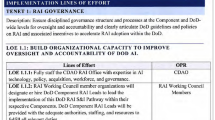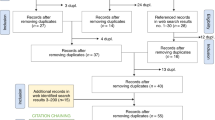Abstract
This chapter examines ethical guidelines as a tool for the governance of artificial intelligence (AI). Analysing the European development towards a trustworthy AI, with a focus on the High-Level Expert Group on AI appointed by the European Commission, the chapter highlights the interaction between guidelines and law in light of technological advancements. The chapter explores why ethical framing has such a prominent place in the discussions regarding AI. Applied AI, here argued, must be understood from its interaction with social structures and human expressions, resulting in a need for a multidisciplinary understanding for its governance. Via an analysis of the fuzziness of the AI concept, as well as the related notions of risk and transparency, the chapter concludes by stressing the necessity to move from principles to process in the governance of AI in the EU.
Access this chapter
Tax calculation will be finalised at checkout
Purchases are for personal use only
Similar content being viewed by others
References
Abbott, K. W., & Snidal, D. (2000). Hard and Soft Law in International Governance. International Organization, 54(3), 421–456.
Bastos, M. T., & Mercea, D. (2019). The Brexit Botnet and User-Generated Hyperpartisan News. Social Science Computer Review, 37(1), 38–54.
Benkler, Y. (2019). Don’t Let Industry Write the Rules for AI. Nature, 569(7754), 161–162.
Bostrom, N. (2014). Superintelligence. Paths, Dangers, Strategies. Oxford: Oxford University Press.
Brundage, M., Avin, S., Clark, J., Toner, H., Eckersley, P., Garfinkel, B., Dafoe, A., Scharre, P., Zeitzoff, T., Filar, B. & Anderson, H. (2018). The Malicious Use of Artificial Intelligence: Forecasting, Prevention, and Mitigation. arXiv preprint arXiv:1802.07228.
Buolamwini, J., & Gebru, T. (2018). Gender Shades: Intersectional Accuracy Disparities in Commercial Gender Classification. Conference on Fairness, Accountability and Transparency, PMLR, 81, 77–91.
Chesney, B., & Citron, D. (2019). Deep Fakes: A Looming Challenge for Privacy, Democracy, and National Security. California Law Review, 107, 1753.
Coeckelbergh, M. (2019). Artificial Intelligence: Some Ethical Issues and Regulatory Challenges. Technology and Regulation, 31–34. https://doi.org/10.26116/techreg.2019.003.
Cotterrell, R. (1992). The Sociology of Law: An Introduction. Oxford: Oxford University Press.
Datta, A., Tschantz, M. C., & Datta, A. (2015). Automated Experiments on Ad Privacy Settings: A Tale of Opacity, Choice, and Discrimination. Proceedings on Privacy Enhancing Technologies, 2015(1), 92–112.
de Laat, P. B. (2018). Algorithmic Decision-Making Based on Machine Learning from Big Data: Can Transparency Restore Accountability? Philosophy & Technology, 31(4), 525–541.
de Vries, K. (2020). You Never Fake Alone. Creative AI in Action. Information, Communication & Society, 23(14), 2110–2127.
Die Bundesregierung. (2020, June 29). Stellungnahme der Bundesregierung der Bundesrepublik Deutschland zum Weißbuch zur Künstlichen Intelligenz – ein europäisches Konzept für Exzellenz und Vertrauen. COM (2020) 65 Final.
Dignum, V., Muller, C. & Theodorou, A. (2020). First Analysis of the EU Whitepaper on AI. ALLAI. https://allai.nl/first-analysis-of-the-eu-whitepaper-on-ai/
Ellickson, R. C. (1994). Order without Law. Cambridge, MA: Harvard University Press.
European Commission. (2018, April 25). Communication from the Commission to the European Parliament, the European Council, the Council, the European Economic and Social Committee and the Committee of the Regions on Artificial Intelligence for Europe. COM (2018) 237 final.
European Commission. (2020, February 19). White Paper on Artificial Intelligence: Public Consultation Towards a European Approach for Excellence and Trust. COM (2020) 65 final.
Fuller, L. L. (1975). Law as an Instrument of Social Control and Law as a Facilitation of Human Interaction. BYU Law Review, 1, 89–98.
Gasser, U., & Almeida, V. A. (2017). A Layered Model for AI Governance. IEEE Internet Computing, 21(6), 58–62.
German Data Ethics Commission. (2019). Opinion of the Data Ethics Commission. Retrieved 20 September 2020 from https://datenethikkommission.de/wp-content/uploads/DEK_Gutachten_engl_bf_200121.pdf
Goodfellow, I., Pouget-Abadie, J., Mirza, M., Xu, B., Warde-Farley, D., Ozair, S., Courville, A., & Bengio, Y. (2014). Generative Adversarial Nets. Advances in Neural Information Processing Systems, 27, 2672–2680.
Hagendorff, T. (2020). The Ethics of AI Ethics: An Evaluation of Guidelines. Minds and Machines, 30, 99–120.
HLEG. (2019a). A Definition of AI: Main Capabilities and Disciplines: Definition Developed for the Purpose of the AI HLEG’s Deliverables. Brussels: European Commission.
HLEG. The (2019b). Ethics Guidelines for Trustworthy AI. Brussels: European Commission.
HLEG. (2019c). Policy and Investment Recommendations for Trustworthy Artificial Intelligence. Brussels: European Commission.
Jansen, S. C., & Martin, B. (2015). The Streisand Effect and Censorship Backfire. International Journal of Communication, 9, 656–671.
Jobin, A., Ienca, M., & Vayena, E. (2019). The Global Landscape of AI Ethics Guidelines. Nature Machine Intelligence, 1(9), 389–399.
Koulu, R. (2020). Human Control over Automation: EU Policy and AI Ethics. European Journal of Legal Studies, 12, 9–46.
Larsson, S. (2017). Conceptions in the Code. How Metaphors Explain Legal Challenges in Digital Times. New York: Oxford University Press.
Larsson, S. (2018). Algorithmic Governance and the Need for Consumer Empowerment in Data-Driven Markets. Internet Policy Review, 7(2), 1–12.
Larsson, S. (2019). The Socio-Legal Relevance of Artificial Intelligence. ‘Law in an Algorithmic World’. Special Issue of Droit et Société, 103(3), 573–593.
Larsson, S. (2020). On the Governance of Artificial Intelligence Through Ethics Guidelines. Asian Journal of Law and Society, 1, 1–15.
Larsson, S., & Heintz, F. (2020). Transparency in Artificial Intelligence. Internet Policy Review, 9(2), 1–16.
Legg, S., & Hutter, M. (2007) A Collection of Definitions of Intelligence. In B. Goertzel & P. Wang (Eds.), Advances in Artificial General Intelligence: Concepts, Architectures and Algorithms (pp. 17–24), Proceedings of the AGI Workshop 2006 (Vol. 157), IOS Press.
Lepri, B., Oliver, N., Letouzé, E., Pentland, A., & Vinck, P. (2018). Fair, Transparent, and Accountable Algorithmic Decision-Making Processes. Philosophy & Technology, 31, 611–627.
Lidskog, R. (2008). Scientised Citizens and Democratised Science. Re-assessing the Expert-Lay Divide. Journal of Risk Research, 11(1–2), 69–86.
Mandel, G. N. (2009). Regulating Emerging Technologies. Law, Innovation and Technology, 1(1), 75–92.
Pasquale, F. (2015). The Black Box Society. The Secret Algorithms that Control Money and Information. Cambridge: Harvard University Press.
Pro Publica. (2016, May 23). Machine Bias. Retrieved September 22, 2020, from https://www.propublica.org/article/machine-bias-risk-assessments-in-criminal-sentencing
Rahwan, I. (2018). Society-in-the-Loop: Programming the Algorithmic Social Contract. Ethics and Information Technology, 20(1), 5–14.
Reisman, D., Schultz, J., Crawford, K., & Whittaker, M. (2018). Algorithmic Impact Assessments: A Practical Framework for Public Agency Accountability. AI Now Institute, 1–22.
Samuel, A. L. (1959). Some Studies in Machine Learning Using the Game of Checkers. IBM Journal of Research and Development, 3(3), 210–229.
Shankar, S., Halpern, Y., Breck, E., Atwood, J., Wilson, J., & Sculley, D. (2017). No Classification without Representation: Assessing Geodiversity Issues in Open Data Sets for the Developing World. arXiv preprint arXiv:1711.08536.
Srivastava, M., Heidari, H., & Krause, A. (2019). Mathematical Notions vs. Human Perception of Fairness: A Descriptive Approach to Fairness for Machine Learning. In Proceedings of the 25th ACM SIGKDD International Conference on Knowledge Discovery & Data Mining (pp. 2459–2468).
Stone, P., et al. (2016). Artificial Intelligence and Life in 2030, Report of the (pp. 2015–2016). Stanford University: Study Panel. Stanford.
Van Dijck, J., Poell, T., & De Waal, M. (2018). The Platform Society: Public Values in a Connective World. New York: Oxford University Press.
von der Leyen, Ursula. (2019). A Union That Strives for More. My Agenda for Europe. Political Guidelines for the Next European Commission 2019–2024. Retrieved 20 September 2020 from https://op.europa.eu/en/publication-detail/-/publication/43a17056-ebf1-11e9-9c4e-01aa75ed71a1
Wilson, B., Hoffman, J., & Morgenstern, J. (2019). Predictive Inequity in Object Detection. arXiv preprint arXiv:1902.11097.
Author information
Authors and Affiliations
Corresponding author
Editor information
Editors and Affiliations
Rights and permissions
Copyright information
© 2021 The Author(s), under exclusive license to Springer Nature Switzerland AG
About this chapter
Cite this chapter
Larsson, S. (2021). AI in the EU: Ethical Guidelines as a Governance Tool. In: Bakardjieva Engelbrekt, A., Leijon, K., Michalski, A., Oxelheim, L. (eds) The European Union and the Technology Shift. Palgrave Macmillan, Cham. https://doi.org/10.1007/978-3-030-63672-2_4
Download citation
DOI: https://doi.org/10.1007/978-3-030-63672-2_4
Published:
Publisher Name: Palgrave Macmillan, Cham
Print ISBN: 978-3-030-63671-5
Online ISBN: 978-3-030-63672-2
eBook Packages: Political Science and International StudiesPolitical Science and International Studies (R0)




